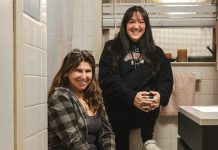
Photograph by Ben Rollins
Atlantans is a first-person account of the familiar strangers who make the city tick. This month’s is Edward Morgan, as told to Xavier Stevens.
No rescue is the same when it comes to bees: They can be anywhere you can imagine, from 30 feet up in a tree to the tarmac of the airport. I think it’s amazing that people call me to rescue bees in the first place. Even though they are terrified, people don’t want to hurt the bees because they know they are good for the environment.
Four years ago, I got into bees for myself and the money. I bought some off Craigslist because I knew they would be good for my family farm and our garden, but I knew nothing about beekeeping. Like anyone else, I was scared to death to go anywhere near them. I didn’t know what I was doing, and I realized, after my first sting to the face, that I was slightly allergic. My wife and everyone I knew laughed at me.
For the next three months, I tried to learn as much as I could on my own, reading books at the library and watching YouTube videos. I learned to be comfortable around them, how to approach a hive and understand when bees are agitated. A friend of mine encouraged me to apply to host an Airbnb Experience for beekeeping. I was accepted as a basic beekeeping course, and it took off. After six more months of learning on my own, I joined the Metro Atlanta Beekeepers Association. It broadened my horizons of what I can do with bees; three years later, I sell bees, make my own honey, teach classes, and rescue bees.
This April, I received a call from a woman in Alaska about her shipment of bees that was rerouted to the Atlanta airport. She told me there were 200 crates that she believed may be damaged and letting out bees. I packed up everything—beehives, vacuums, and food for the bees—and rushed to the airport. When I arrived, I realized the 200 packages, filled with around 10 million bees, weren’t damaged but were placed in a situation where they couldn’t survive. After a small amount of bees escaped, the packages were set out on the tarmac with their cages reaching 90 to 100 degrees, placed upside down. The bees had no access to their food. I could see there was no movement in many of the packages. The bees were dying.
After deliberating with the owner and Julia Mahood, one of the top beekeepers in the state, we decided it was best to give away the bees in hopes that some would survive. Once we sent out the message for people to pick up the bees, I was blown away by the response. The only pressure I felt during the entire experience was trying to keep up with the number of phone calls. In 45 minutes, dozens of beekeepers showed up at the airport and somehow found me on the tarmac to save these bees. The story became much bigger than I anticipated. At the next bee club meeting, the members applauded me. Someone sent me a postcard from Michigan thanking me. I took home one crate of bees from the airport with five packages in it. Only two packages and one queen survived, so after a week of nursing the bees back to health, I merged them. They are doing well on my farm.
Beekeeping is so much more than the farm and the money. Bees allow me to help the environment, and I can offer up my help to rescue them. I meet amazing people that I may never meet otherwise. I teach people about bees and break down their fear through my classes and the Airbnb Experience. The best part is that I’m still learning. I hope to become a master beekeeper one day, but I’ve been busy with a full-time job. Sometimes, it’s hard to sit down and crack that book open to study. It feels crazy that bees—something I stumbled into—have opened up my world.
This article appears in our September 2022 issue.














